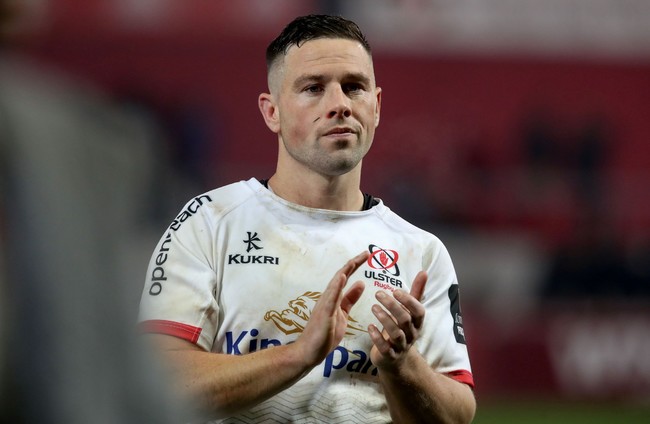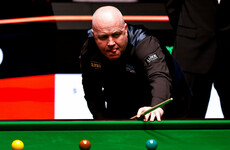THERE’S BEEN A recurring narrative coming out of the Ulster camp in recent weeks, a new philosophy and a new mindset exuding from the squad at Kingspan Stadium.
Iain Henderson and Jacob Stockdale, on their returns from the World Cup, have both described how they’ve felt “refreshed” upon linking back up with their province and how training has never been better.
Skills coach Dan Soper has reflected on how this team has an unrelenting work ethic, likewise centre Luke Marshall, who went further and commented on how this team has used the criticism of being considered soft from Bill Johnston’s experience with Munster and used it to spur themselves on.
That is perhaps reflected behind the scenes by the self-criticism this squad is being put through, both of themselves and their team-mates. Rather than shy away from challenging their peers for a mistake in a game, they’re encouraged to point it out. Every flaw, no matter how small, is scrutinised.
But rather than hinder morale, it’s a growth exercise. While previous Ulster teams – those labelled as “soft” – might have taken it poorly, this team revels in it, as the results have suggested. They know the criticism isn’t personal, and it is not intended to tear each other apart. Rather, it is to build each other up and try and help team-mates reach their full potential.
And so far, the results can’t be disputed. Ulster have six wins from their opening eight games, are sitting top of their Heineken Champions Cup pool and have a 10-point buffer in the play-off spots in Conference A of the Guinness PRO14. The confidence around the northern province hasn’t been this high since the halcyon years of Ferris, Muller, Pienaar et al.
“I think you do need that if you want to push each other forward, and the standards we set for each other are very high,” claims scrum-half John Cooney of the in-house scrutiny.
“We do have a back line that are very good at attacking, and as long as we start ahead of those standards I think it makes a big difference on how we perform.
Obviously we all want to play well and we want to do as well for the team, so it is important that we put each other under pressure. That is something we have improved on over the last couple of years.
“But it’s when we play well it is the time you can do that,” he adds of how to strike the balance between analysing as much as possible and being over-critical.
“Confidence-wise, if we have a bad performance we don’t want to abuse each other and say how crap we are. I think after (a win like) Scarlets is the time to encourage each other to do the little things better.”
While the majority of the work done is both led by coaches and players – Soper has talked about how the province are eager to give players ownership over their own personal growth and what skills they want to develop – Cooney is quick to credit head coach Dan McFarland with instilling the new edge around the squad.
Now in his second year with the province, it’s not hard to see what the former Connacht prop has been trying to do. He’s culled several members of the squad and replaced them with hard-nosed, no-nonsense players and he’s challenged his players to ‘fight for every inch’ and ‘squeeze every drop’ out of every one of their performances.
The net result is this is a much grittier, much tougher team that grinds out results that previous Ulster teams may not have. You saw it when they took a hard-fought point in Thomond Park and when they held out Clermont and Bath in Europe recently. Even last season, they ground out late wins over the Scarlets and Edinburgh that arguably they didn’t deserve. But the key thing is they’re winning, both in games where they’re dominating and in games where they can end up seeing less than 40% possession and territory.
And when that happens, it’s no longer a surprise.
“(Dan) is mad for the ‘fight for every inch’ mentality he brought in last year, and you saw it in a lot of the games we played where we came to win games late on,” reflects Cooney.
“Coming back in the summer and seeing how hard everyone was working, when you work that hard for each other it’s a lot more difficult to give up in games because you know how hard everyone around you is going to give.
“I think that is something we’ve improved massively on in the last few years. The harder you work, the harder it is to give up, and I think that is reflected in a lot of our performances.”
As for somebody to accurately symbolise what Ulster are trying to do, look no further than Cooney himself as someone who is trying to squeeze every last drop out of what he personally has to offer on the pitch.
His constant pursuit to better himself led him from Leinster to Connacht and then to Ulster, where he has found a home. But just because he’s found regular game time and a fan base that chants his name with every kick at Kingspan Stadium, it doesn’t mean he’s happy with where he’s at in terms of his performances.
“I fired a ball too hard at (Robert) Baloucoune and he could have went through,” he points out of one of his mistakes highlighted during the review of that win over the Scarlets last weekend.
And, of course, missing out on a spot in Joe Schmidt’s squad for the World Cup in Japan is another reminder that he’s not where he wants to be yet, and that too is why he continues to drive himself to the next level, admitting he’s been reading Ryan Holiday’s The Obstacle Is The Way to deal with that disappointment.
On the pitch, you wouldn’t think Cooney had been given a setback given the way he’s taken his game to another level since the disappointment of being cut from Schmidt’s squad. He’s started seven of Ulster’s eight games this season, forged a blossoming relationship with fly-half Billy Burns and established himself as a leader in the Ulster squad.
And, while not necessarily the first talent required in a scrum-half’s box of tricks, he’s also found an eye for the whitewash, as an added bonus. His try against the Scarlets last weekend was his third in as many games.
Some are talking about him as Ireland’s starting scrum-half come the Six Nations as the Andy Farrell era takes hold, but it’s not something Cooney himself is entertaining. Well, not yet anyway.
“I am happy with how I’m playing, but it is hard to get the full package. In games where I’ve kicked well, I’m disappointed with my passing, in games that I’ve ran well I’ve been disappointed with my defence, so it is hard to get that game where you feel happy with every part of your game,” says the Dubliner.
“I came off in the Scarlets game disappointed with my passing, but then you watch it back on a Monday it’s never as a bad as you think it is.
My mentality is I think I have never played as well as I have, then I watch it back. I prefer to be like that than thinking coming off you’re the man.
“I do have high standards and I’m just trying to get better.”
One of the best ways to prove that is by driving Ulster on to more success, and there is a recognition that this weekend they can take a big step towards making it back-to-back seasons in the knockout stages of the Heineken Champions Cup should they defeat Harlequins in Belfast on Saturday.
It’s where this team want to be, and it’s where they feel they deserve to be, particularly after doing the hard work to pick up wins in their opening two games away to Bath and then at home to Clermont. And it would be another milestone on the path that the province are on under McFarland in just the second year of his tenure.
There will be no complacency though. Ulster, of any team, should know exactly what it means to pull two massive back-to-back results out of the bag to resurrect a season given they did it themselves last year against the Scarlets, which gave them the momentum to not just make the European quarter-finals, but also the semi-finals of the Guinness PRO14.
You don’t see there being any complacency with this team, though. A cursory glance at how devastated those players were trudging off the pitch at Aviva Stadium in April after losing to Leinster in the quarter-final should be all the reminder you need that this team are hell-bent on making it back this time around too.
“If you look back to the Scarlets back-to-back last year, that was a big moment for us and if you were to talk about our season really kicking on last season it was probably down to those two performances,” admits Cooney.
“(The quarter-final) was a game everyone enjoyed being at the top flight of rugby, in the Aviva with a fully packed stadium against Leinster, it was definitely one of those situations that everyone just loved. Even talking to someone like Marcell Coetzee, that gave him the fire to go back and play for SA because he wanted to be a part of those Test match games and it definitely felt like a Test match.
“It felt like we belonged there and it was one of those bittersweet performances where we performed really well and didn’t get the win. It was good to get the taste for that again and it’s definitely something driving us in these games. Everyone wants to get back to that quarter-final.
“So, for us to perform again here back-to-back is huge. It’s good being here first and it’s a big one at home. We’re on that big record at home as well, which is a little bit of added pressure as well, but for us it’s easy to get up for a 3 o’clock kick-off at Kingspan.”
Cooney pauses briefly and allows himself to turn and look out the window of the media centre at Kingspan Stadium to survey the pitch below him, which is shrouded in darkness, but it’s still there to inspire a quick grin before he turns back again with a renewed hunger in his eyes.
“I’m looking forward to it.”














It’s like the x factor!
Beyond leftfield – had been tipping the US but this kinda stuff make Love looks like he’s imploding trying to please everybody. Woods AND Bubba – insane.
I want to win the Ryder Cup but I want to win it bettah
You can understand that can’t you?
First captains.. second captains.. whatever..
Ah you got in before me
I hope he brings the bubbacart with him